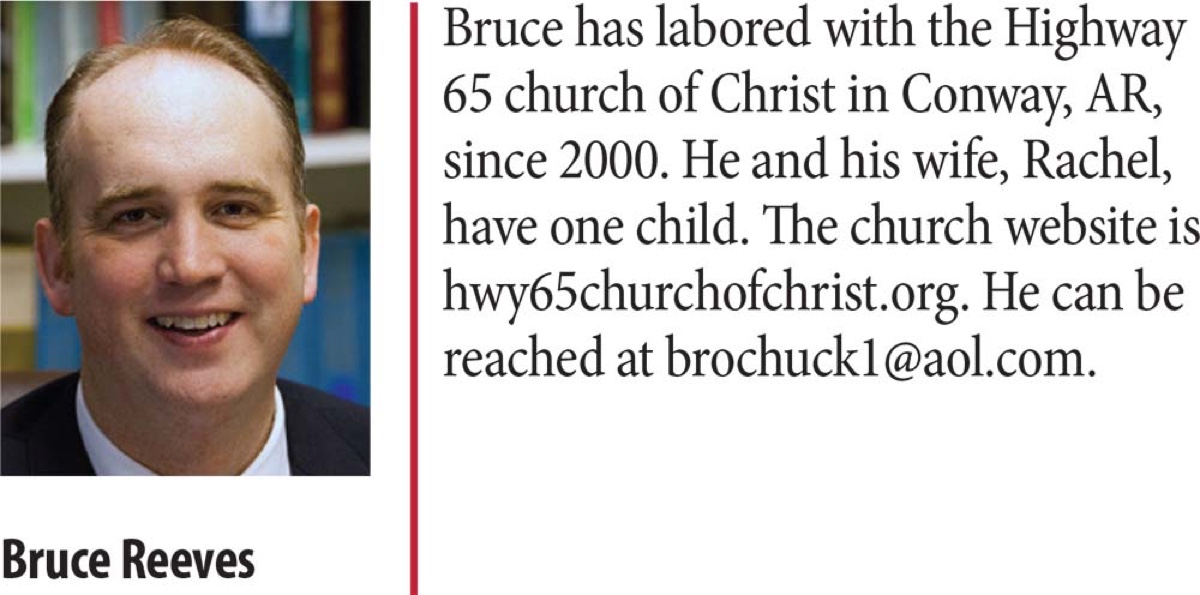
by Bruce Reeves
Synopsis: To share fellowship with God the Father, Jesus Christ, and the Holy Spirit, we must walk in the light (1 John 1:5–2:6). To maintain fellowship with each other, we must manifest the right disposition and adhere to the right doctrine (Eph. 4:1-6).
Every devoted disciple has asked, “How can we maintain fellowship as God’s people?” In Ephesians 4:1-6, the apostle Paul presents a divine program for overcoming sinful attitudes, division, and false teaching—all of which threaten our oneness as Christians. When the unity of believers is fractured, our hearts are filled with sadness and pain. No doubt, we have all witnessed congregations torn asunder, relationships destroyed, the work of the Lord hindered, and devotion to Christ abandoned through division. Yet, God’s purpose is for His children to strive together for the faith of the gospel with “one mind” (Phil. 1:27). Paul wrote to the Corinthians, “Now I exhort you, brethren, by the name of our Lord Jesus Christ, that you all agree and that there be no divisions among you, but that you be made complete in the same mind and in the same judgment” (1 Cor. 1:10).
From Cain and Abel until the present, brother has risen against brother, and nation against nation. This world is marked by dissension, division, and strife. Even in religion, the order that humanity has chosen for itself is fighting and quarreling: sect against sect and party against party. This behavior is diametrically opposed to the will of Christ. Jesus said, “I do not ask on behalf of these alone, but for those also who believe in Me through their word; that they may all be one; even as You, Father, are in Me and I in You, that they also may be in Us, so that the world may believe that You sent Me” (John 17:20-21). It is only through surrendering to the Holy Spirit’s teaching that we can enjoy the oneness of which Christ speaks.
Paul begins by imploring Christians to walk worthy of their calling in Christ (Eph. 4:1). This calling transforms our relationships with others and leads us to live in harmony with God’s divine purpose (1 Thess. 2:12; 2 Thess. 2:12-13; 1 Pet. 1:22; 2:9). The Lord teaches us that one of the identifying marks of genuine discipleship is to show love for one another (John 13:34-35). Since we mutually share in the blessings of Christ, we ought to treat one another with affection, compassion, and humility (Phil. 2:1-2).
It is worthwhile to note the relationship between the terms “walk” (Eph. 4:1) and the phrase “the unity of the Spirit” (Eph. 4:3). The “unity of the Spirit” is only enjoyed by those who “walk in the Spirit” (Gal. 5:13-26). The “works of the flesh” prevent us from “walking by the Spirit,” being “led by the Spirit,” and “living in the Spirit” in that we are refusing to receive the “word of Christ” into our hearts (Gal. 5:16, 18, 25; Col. 3:16). First, one begins to have hostility or enmity toward a brother and does not recognize the spiritual poison that is filling his soul. Then the hostility expresses itself in sinful anger, tension, and friction. Next, if the soul is not cleansed of this growing defilement, jealousy will burn in the heart and even develop into hatred. Now we see someone who has entirely departed from the Lord’s purpose. What can we do to avoid walking down this dark path?
Fellowship among God’s people can only be enjoyed when we have the attitude of Christ (Phil. 2:5; Col. 3:12-14). Believers are encouraged to “walk in a manner worthy of the calling with which you have been called, with all humility and gentleness, with patience, showing tolerance for one another in love, being diligent to preserve the unity of the Spirit in the bond of peace” (Eph. 4:1-3). We are given the divine formula for the attitude that promotes unity among Christians. While “humility” does not deny our boldness in the proclamation of Jesus, it must lead us to acknowledge how undeserving we are of God’s amazing grace as we show His love toward others. Lowliness of mind renounces selfish ambition and self-exaltation and embraces the true mind of Christ (Phil. 2:1-8). In areas of opinion and personal judgment, we must bear the weaknesses of others and strengthen them (Rom. 15:1). This involves self-examination concerning our words, actions, and posts and may lead us to become more sacrificial and discerning.
We are also encouraged to show gentleness or meekness toward one another in the family of God (Eph. 4:2). This quality does not translate into spinelessness or weakness, but gracious reasonableness in our disposition (Phil. 4:5) It is the strength of character that expresses self-control even in times of controversy. Moses and Jesus were powerful men, but were also”meek” (Num. 12:3; Matt. 11:28-30). Paul emphasizes our need to be “longsuffering” and patient as we show tolerance for one another in love (Eph. 4:3). We are to be an enduring people who pursue the building of faithful relationships with fellow-believers. To be forbearing, we must exercise self-restraint, resist a hypercritical spirit and hasty judgments, and remain resolute in manifesting the love of the Lord (1 Cor. 13:4-7).
We will give our all to be “diligent to preserve the unity of the Spirit in the bond of peace” (Eph. 4:3). The term translated as “endeavoring” means to make haste or give diligence. Oneness among saints does not occur accidentally and only happens when we value it vital to our relationship with God. To “keep” or “preserve” unity is to guard and protect our bond of peace.
Our fellowship is built on the truth of the gospel. Paul beautifully describes the seven great “ones” of our unity in Christ, “There is one body and one Spirit, just as also you were called in one hope of your calling; one Lord, one faith, one baptism, one God and Father of all who is over all and through all and in all” (Eph. 4:4-6). The New Testament warns us of the danger of compromise by emphasizing the foundation of our fellowship. Jesus’s prayer for the unity of His disciples was grounded in the truth of the word of God (John 17:17, 19). John explains that we have fellowship with one another because we each have fellowship with Christ through obedience to the gospel. He writes, “What we have seen and heard we proclaim to you also, so that you too may have fellowship with us; and indeed, our fellowship is with the Father, and with His Son Jesus Christ” (1 John 1:2). We have fellowship with God and His apostles as we abide in the proclamation of their teaching and walk in His light and love (Acts 2:42; 1 Cor. 11:2; 1 John 1:9-2:5; 2 John 9-11).
We enjoy our fellowship through the Lord’s grace and obedience to the truth:
If we say that we have fellowship with Him and yet walk in the darkness, we lie and do not practice the truth; but if we walk in the Light as He Himself is in the Light, we have fellowship with one another, and the blood of Jesus His Son cleanses us from all sin” (1 John 1:6-7).
Some have attempted to present this passage as a defense of neo-Calvinism to broaden boundaries of fellowship. The immediate context determines the meaning of any verse of Scripture, and this one is no exception to that principle. There is nothing that should indicate an automatic cleansing of the sinner who refuses to repent and confess his errors (1 John 1:9; 2:1). What should we do as Christians when we sin? The Scripture teaches us to repent of our sins and confess our errors to God. Fellowship cannot be preserved biblically by refusing to teach on issues regarding our worship, the work of the church, marriage, divorce, and remarriage, modesty, lascivious dancing, or other critical issues that confront congregations today. Biblical fellowship is not protected by shaping a mindset that softens and desensitizes the Lord’s people to our collective responsibility of serving God with a godly attitude in truth. The unity of Christians is not well served by those who, with ambiguity and craftiness, steer churches away from a zealous and strong stand for the doctrine of Christ in the name of “love and unity.” The unity we pursue is “the unity of the Spirit”! It is the oneness produced by the Holy Spirit through the revelation of the gospel. It is in this teaching that we exemplify the attitude of Christ, the truth of the gospel, and the desire to edify and equip one another to glorify our Father. What a wonderful fellowship we enjoy in our Lord and Savior! 



